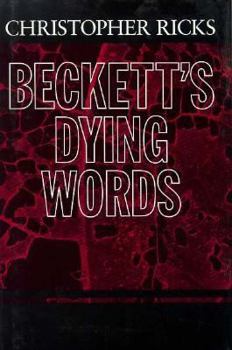Beckett's Dying Words: The Clarendon Lectures 1990
Select Format
Select Condition 
Book Overview
Most people want to live forever. But there is another truth: the longing for oblivion. With pain, wit, and humor, the art of Samuel Beckett variously embodies this truth, this ancient enduring belief that it is better to be dead than alive, best of all never to have been born. Beckett is the supreme writer of an age which has created new possibilities and impossibilities even in the matter of death and its definition--an age of transplants and life-support.
But how does a writer give life to dismay at life itself, to the not unwelcome encroachments of death, when it is for the life, the vitality of their language that we value writers? Beckett became himself as a writer when he realized in his very words a principle of death: in clich s, which are dead but won't lie down; in a dead language and its memento mori; in words which mean their own opposites, like cleaving; and in what Beckett called a syntax of weakness.
This artful study explores the relation between deep convictions about life or death and the incarnations which these take in the exact turns of a great writer, the realizations of an Irishman who wrote in English and in French, two languages with different apprehensions of life and of death.
But how does a writer give life to dismay at life itself, to the not unwelcome encroachments of death, when it is for the life, the vitality of their language that we value writers? Beckett became himself as a writer when he realized in his very words a principle of death: in clich s, which are dead but won't lie down; in a dead language and its memento mori; in words which mean their own opposites, like cleaving; and in what Beckett called a syntax of weakness.
This artful study explores the relation between deep convictions about life or death and the incarnations which these take in the exact turns of a great writer, the realizations of an Irishman who wrote in English and in French, two languages with different apprehensions of life and of death.
Format:Hardcover
Language:English
ISBN:0198123582
ISBN13:9780198123583
Release Date:August 1993
Publisher:Oxford University Press, USA
Length:224 Pages
Weight:0.90 lbs.
Dimensions:0.8" x 6.8" x 8.8"
Customer Reviews
2 ratings
Too much 'death' is a downer
Published by Thriftbooks.com User , 18 years ago
Ricks intelligence and assuidity in reading Beckett are evident. He also has insights into the subject in general, including one he especially focuses on the fact that 'losing consciousness' is a dream much less spoken about, than felt. Nonetheless weltering too long, even in mind, in thoughts of oblivion is not the happiest business in the world. And laughter too takes on a kind of hollowness even if one is laughing only at one's own demise. Beckett too had this quality, of being an intelligent and poetic writer but one ( at least in my case) one could only take small doses of at a time. Too much death is a downer. I myself always keep the contrary- thought of Spinoza in mind. i.e. " The free man thinks of nothing less than Death. And his meditation is a meditation on Life."
Love, death, and the whole of damned Beckett
Published by Thriftbooks.com User , 19 years ago
Ricks brings an impressively thorough, and necessarily playful, acumen to his very close reading of Beckett. For a critic who has devoted scrutiny to Dylan as well as the canonical heavy-hitting English canon of bards, Ricks comes equipped with his OED and a vastly patient ability to dig into what on the surface, given Beckett's elusive and often skeletal expressions, can be deceptively straightforward utterances. Markedly even among Beckett's legion of exegetes, Ricks takes time to compare the French with the English renderings. and unearths from both versions witty and insightful analyses. His energy rarely flags. He may think a bit too much of his cleverness, I suspect, but this is forgivable when we can learn so much from his recondite schtick. As these apparently originated as 1990 Clarendon lectures at Oxford, Ricks keeps aware of an audience--on the page or in person--who is following, and presumably chuckling at, his remarks. You get the sense of Ricks, as with Beckett, performing his recitals rather than transcribing them for actors or academics. The whole point of death and extinction in Beckett remains an often too little observed topic, and that Ricks stays pretty much on target the whole way through proves an impressive feat. The book takes in, by the way, topics germane to anyone with a general knowledge of Beckett, and is not as limited a concern as the title may suggest. Ricks' infectious interest in puns, allusions, and innuendo makes this a bonus for readers similarly afflicted. Ricks remembers that, as so much in life as well as literature, Beckett is deadly serious as he is uproariously sly. Doomed to lack as encyclopedic a knowledge of the Beckett canon (and who among you reading this could ever attain such a familiarity as Ricks?), still, I enjoyed this work much more than most criticism I've had to peruse, whoever the scholar or subject. John Banville judges this book, at least from the excerpt as a back cover blurb, "extremely and gruesomely funny."






